LOS ANGELES — A Thursday morning in February started like most for bus operator and UTU Local 1564 member Darwin Dawson — making fruit and vegetable protein shakes for fellow Division 18 workers as part of the Los Angeles County Metropolitan Transportation Authority’s health and wellness program.
By afternoon, Dawson was standing on the set of the Jimmy Kimmel Live show in Hollywood, collecting $650 in cash from host Kimmel — and it had nothing to do with buses or fruit and vegetable protein shakes (the latter a southern California thing, so don’t ask).
So let’s back up and sit a spell for this yarn, as Dawson is one fascinating fellow.
It begins in the garage of Dawson’s home in Redondo Beach, which he converted to a private sports bar for his friends and family. On display everywhere were old leather football helmets, antique cleats, brightly colored neon beer signs, five television screens — a memorabilia laden man-cave if ever there was one.
And, somehow, there was room for Dawson also to restore vintage Chevy pick-up trucks — the source of cash to keep those friends and family in beer and pretzels during Angels, Clippers, Dodgers and Rams ballgames.
Somehow, some hard-to-find ’49 Caddy parts found their way into the garage — the source of a barter that would lead to the Kimmel show. But let’s not get ahead of this story.
Some years back, in exchange for hard-to-find ’49 Caddy chrome bumper and other parts, Dawson acquired a 100-pound, 6’7″ fiberglass statue of basketball legend Michael Jordan, which fit oh so well in the home sports bar a/k/a Dawson’s garage.
Man-caves can change, and when Dawson decided it was time to redecorate — from a sports bar motif to an auto/bus motif — the Jordan statue become surplus. So Dawson put it up for sale at $650 on Craigslist.
Then came the call from producers of the Kimmel show. Kimmel wanted the statue as a gift to present Jordan on his birthday.
So, with help from Dawson’s 12-year-old son, into a Dawson-restored ’68 Chevy pick-up went the 100-pound statue, and down the road went Dawson and his son to the Jimmy Kimmel Live set in nearby Hollywood — a building but 100 yards from the route of the LACMTA bus Dawson drives.
In his driver’s uniform — at Kimmel’s request — Dawson gained his few minutes of national fame, selling the statue to Kimmel not for the $600 Kimmel offered, but the $650 Dawson insisted on receiving.
Hey, he’s a UTU brother, and UTU brothers and sisters don’t let even the Jimmy Kimmels of the world get the better in negotiations.
Basketball fans may notice something amiss in the photo. Yes, Jordan’s jersey shows #32, not the #23 Jordan wore with the Chicago Bulls.
Kimmel noticed that discrepancy, and Dawson had the answer. The statue was never “authorized” by Jordan — as were the legendary Nike Air Jordan shoes — but was created in the Philippines, perhaps by a dyslectic sculptor of knock-offs.
While insomniac Americans watched Dawson on Kimmel’s late night show, Dawson was sound asleep. He begins his day with the LACMTA at 4 a.m.


